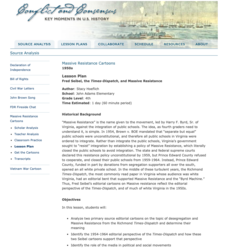Curated OER
Segregated America
Students investigate Jim Crow laws. In this segregation lesson, students analyze images that display American segregation. Students use the provided questions to aid them in their evaluation of the images.
Center for Civic Education
The Power of Nonviolence: Rosa Parks: A Quest for Equal Protection Under the Law
Teach young historians about the historical legacy of Rosa Parks with a multi-faceted lesson plan. Pupils follow stations and use journals to explore prominent events, analyze primary resource documents, and engage in interesting...
Curated OER
US Civil Rights Movement: Beginnings through the 60s
A real find for a U.S. History teacher, this presentation could supplement many class sessions about the Civil Rights Movement. Pictures of events, major figures, and "Whites Only" signs are striking and effective for even your most...
Teaching Tolerance
Mass Incarceration as a Form of Racialized Social Control
Mass incarceration: A result of a tough stance on crime or racial discrimination, you decide. Academics explore the history and reasons behind mass incarcerations in the United States and its impact on ethnic communities. The...
K20 LEARN
Plessy v. Ferguson: An Individual's Response to Oppression
After generating research questions rated to segregation, groups are given a primary source document (Jim Crow Laws, Black Codes, Plessy v. Ferguson, etc.) and craft a presentation that details the key elements of their assigned...
PBS
Ken Burns: Jackie Robinson Living in Jim Crow America
Your class members may know that Jackie Robinson was the first African American man to play Major League Baseball, but they may not be aware of his efforts to achieve social justice. A clip from Ken Burns: The Jackie Robinson Collection...
Curated OER
Todd Duncan: The First Porgy
Students view a video and conduct research about Jim Crow laws and their effects on race relations.
Curated OER
The Civil Rights Movement
High schoolers examine the Jim Crow Laws and goals of the Civil Rights movement. They read and discuss handouts, answer questions, conduct research, and write an essay about the effects of the Civil Rights movement.
Curated OER
Freedmen & Jim Crow
In this United States history activity, students utilize a word bank of 10 terms or phrases to answer 10 fill in the blank questions about the African American experience following the Civil War. A short answer question is included as...
Curated OER
Seeking Civil Rights
Students explore the impact of the Plessy v. Ferguson case. For this social justice lesson, students examine the case, Jim Crow laws, and non-violent forms of protest. Students write essays to persuade the government regarding unjust laws.
PBS
Breaking the Code: Actions and Songs of Protest
Ezell Blair, Jr., David Richmond, Franklin McCain and Joseph McNeil changed history. Their sit-in at the lunch counter of the Woolworths in Greensboro, North Carolina on February 1, 1960 became a model for the nonviolent protests that...
Curated OER
Negro Leagues Baseball and the Law
High schoolers examine historical law and its impact on Negro Leagues Baseball and Black Americans. Students identify and research laws contributing to segregation or integration, and choose one law to reenact in a historically accurate...
Center for History and New Media
The Daily Experience of the Laurel Grove School, 1925
What was daily life like for those attending segregated schools in 1925? Modern learners fill out a KWHL chart as they explore historical background and primary source documents about the Laurel Grove School in Fairfax County, Virginia....
Curated OER
Claudette Colvin: Twice Toward Justice
Use the historical account of Claudette Colvin to study civil rights and connect past injustices to modern issues. As learners read, they examine chapter titles, record quotes, and participate in discussion. Next, they research active...
Roy Rosenzweig Center for History and New Media
Fred Seibel, the Times-Dispatch, and Massive Resistance
A lesson plan challenges scholars to analyze editorial cartoons created by Fred Seibel, illustrator for the Times-Dispatch, during the Massive Resistance. A class discussion looking at today's editorial pages and Jim Crow Laws leads the...
K20 LEARN
The Bank Of Justice: Civil Rights In The US
To launch a study of racial segregation and integration, young historians first watch a news video about a prom in Georgia that was first integrated in 2013. They then compare the goals in Lincoln's Gettysburg Address to King's "I Have a...
Curated OER
John Gary Evans and the Politics of Race
Students read letters written by Evans and Gunton regarding race relations. In this Progressive Movement lesson, students interpret the intentions and tone of the letters to understand contemporary racial beliefs. Students discuss the...
Curated OER
Latinos and the Fourteenth Amendment: A Primary Document Activity
Students explore Latinos and the Fourteenth Amendment. In this government and law lesson, students analyze the ruling in Hernandez v. Texas. Students predict how the United States would be different if the court had made an alternated...
Curated OER
Segregation: From Jim Crow to Linda Brown
Young scholars examine the African American social, economic, and political conditions between 1896 and 1953. In this segregation lesson, students analyze primary sources to develop an understanding of the plight of African Americans'...
EngageNY
Grade 11 ELA Module 2: Unit 1, Lesson 12
Readers closely examine paragraph nine in Du Bois's "Of Our Spiritual Strivings" to understand prejudice's meaning and research Jim Crow laws.
Curated OER
Writing About Race
Fourth graders explore racial discrimination focusing on Jim Crow laws. They read an excerpt from Richard Wright's autobiography and discuss how viewing the subject from the his point of view affects their opinions.
Curated OER
Zora Neale Hurston:Fighting Jim Crow through the All-Black Community
Students explain the importance of equality of opportunity and equal protection of the law as a characteristic of American society and evaluate the validity and credibility of different historical interpretations.
American Institute of Physics
Physicist Activist: Dr. Elmer Imes and the Civil Rights Case of Juliette Derricotte
Elmer Imes was not only a brilliant physicist but also a civil rights activist. After an introductory lecture, groups read two articles about a traffic accident that killed one Fisk University student and injured several others. The...
American Institute of Physics
The Physicist's War: Dr. Herman Branson and the Scientific Training of African Americans during World War II
The mobilization of soldiers for World War II resulted in a worker shortage in the defense industries, especially in the fields of physics and other sciences. The Engineering, Science, and Management War Training program (ESMWT) was...

























